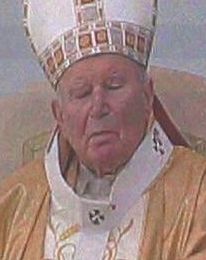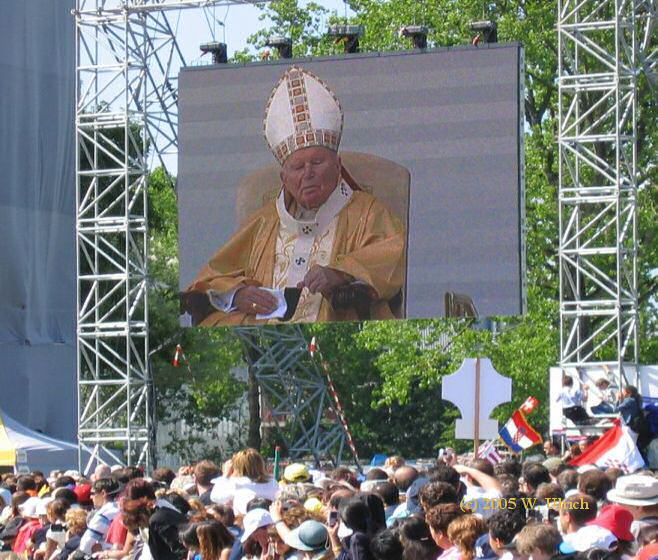Werner Ulrich's Home Page: Picture of the Month
Now "Ulrich's Bimonthly"
April 2005
Human Dignity First


Human dignity first: Karol Wojtyla (1920-2005), Pope John Paul II (1978-2005) The light of an extraordinary life has faded, but it will continue to illuminate mankind's quest for human dignity.
Photograph 6 June 2004 W. Ulrich
|
|
For a hyperlinked overview of all issues
of "Ulrich's Bimonthly" and the previous "Picture of the
Month" series,
see the site map
John Paul II's legacy between global change and traditionalism There can be little doubt that John Paul II will be recognized as one of the most outstanding, albeit somewhat controversial, popes of all times. Immensely popular and charismatic as well as intellectually brilliant, he has made the Catholic Church a respected voice world-wide, a true global player. Even so, lacking historical distance, it is not easy to tell what in the longer term will be recognized to be the major legacy of Pope John Paul II. At least at first glance, there seems to be a striking tension in the way he interpreted his role as the highest moral voice of the Catholic Church: while he was committed to political, social, and economic change towards a free and just society everywhere, he was at the same time determined to defend traditional Catholic dogmatism against reformist movements within his church.
In the first role, as a moral voice committed to change, John Paul II became on of the most important figures in the struggle against the totalitarian Communist regimes of Eastern Europe. With his 1979 visit to Poland, he sparked a spirit of religious and civil emancipation from a Communist regime and ideology that were suppressing the religious freedom of the people. He thus helped prepare the ground for Lech Walesa's Solidarity movement and ultimately, the downfall of the Iron Curtain. It is certainly no exaggeration to attribute a historical dimension to John Paul's involvement in the liberation of Eastern Europe. At the same time, it should be said that with equal determination, though perhaps less successfully, he was relentless in admonishing the Western world of the dangers of an unbridled (neo-liberal) capitalism that was not made to serve the cause of human freedom and community.
With respect to his second role, as a guardian of traditional dogma within the church, the legacy of John Paul II is less clear, and probably less successful, although only history can tell what his firm stance in dogmatic issues means for the future of Catholicism. Confronted with calls for reforms within the church, he demonstrated an unbending traditionalism, an unshakeable determination to keep to the dogmatic teachings and values of the past. To some, this was the only possible stance to take with a view to preserving the unity of the church at a world-wide level. To others, speaking of traditionalism may be too mild a way of putting it; in some cases, e.g., concerning the roles of women in the Catholic Church or the fight against Aids in Africa, many observers may indeed find it more accurate to call his stance outrageously conservative and dogmatic, in a way that risks being inimical to human dignity and progress.
However, I do not think such classifications do justice to a man who through his work has gained himself so much credibility and respect, for two reasons. First, from a philosophical point of view, we cannot shut our eyes to the historical fact that the Catholic Church as an institution is built on a dogmatic tradition; that it believes in the objective truth of this dogmatic tradition and insofar cannot easily accommodate other views and traditions; and that it assigns to the Pope the role of the highest guardian of that tradition and hence, of embodying an absolute dogmatic authority. Enlightenment in the sense of the modern philosophical tradition, and particularly in the sense of Immanuel Kant's call for self-reflecting autonomy of the individual, does not belong to its philosophical foundations. As a student of Kant, I may regret this state of affairs; it seems to me that the Enlightenment tradition provides an important (if not indispensable) foundation for exactly those values which John Paul II is standing for – securing human dignity and freedom, building open and just societies everywhere. I do not believe that these values can ultimately be secured on the basis of dogma and authority. Rather, the Catholic Church has a lot to catch up on its historical failure to accommodate basic Enlightenment ideas. Nevertheless, it appears inadequate to judge a pope's significance according to such Enlightenment criteria only, rather than according to pastoral criteria. Religion in this respect differs from philosophy; above all, it is to help people experience acts of faith, and in this respect John Paul II excelled – he knew so well to reach the hearts and minds of people and to move them deeply.
Second, considering the personal charisma of John Paul II, characterizing him along the lines of conservatism versus reformism (or dogmatism versus tolerance) risks missing the core of his beliefs and endeavors. If we want to do justice to him, we need to make an effort to understand and appreciate this core. I think John Paul II gave an accurate theological expression to it in his first Encyclical, titled Redemptor Hominis – The Redeemer of Man (1979):
Deep amazement at man's worth and dignity Here is a key passage from Redemptor Hominis, titled "The human dimension of the mystery of the Redemption":1)
"Man cannot live without love. He remains a being that is incomprehensible for himself, his life is senseless, if love is not revealed to him, if he does not encounter love, if he does not experience it and make it his own, if he does not participate intimately in it. This … is the human dimension of the mystery of the Redemption. In this dimension man finds again the greatness, dignity and value that belong to his humanity.… How precious must man be in the eyes of the Creator… The name for that deep amazement at man's worth and dignity is the Gospel, that is to say: the Good News." (Redemptor Hominis, John Paul II's first Encyclical, 4 March 1979, Ch. II, Sec. 10.)
I suspect it was this deep dimension of human dignity and value which provided the basis for John Paul II's reformist call (formulated in strictly theological terms, to be sure) for emancipation and liberation from the Communist suppression of individual freedom and religion; and that it was also this same deep amazement at the worth and dignity of human life which prompted him to become such a stout defender of the traditional stance of his church against allowing any kind of intervention that threatens to manipulate or violate life, whether in the form of birth control or abortion, euthanasia, genetic engineering, or war. This quest for protecting human dignity from any kind of manipulation runs like a thread through his work and makes it understandable why he could at the same time promote far-ranging political, economic and social change while apparently being a dogmatic hard-liner against internal reforms of Catholicism. It makes it equally understandable why millions of people around the globe, who may have thought differently on these dogmatic issues, nevertheless continued to revere this pope as a voice of utmost credibility. Puzzled as many of them may have been by the apparent contradictions in his position, they must have felt the extraordinary force and depth of his convictions, and the absolute sincerity and dedication with which he worked for them.
1) John Paul II:
Redemptor
Hominis.
Encyclical
of 4 March
1979.
John Paul II about market economy The same theologically grounded belief in the unique value of human life explains the way John Paul II evaluated different forms of government and economic systems, and in particular the market economy. The relevant criterion for him could only be the extent to which a political or an economic system promotes or prevents integral human development, understood in an encompassing sense that includes personal freedom and dignity, family and community, and spiritual fulfillment. Hence, capitalism is not in itself good or bad; rather, as he explains in his 1991 Encyclical Centesimus Annus, its moral acceptability depends on the way we govern it: 2)
"Can it perhaps be said that, after the failure of Communism, capitalism is the victorious social system, and that capitalism should be the goal of the countries now making efforts to rebuild their economy and society? Is this the model which ought to be proposed to the countries of the Third World which are searching for the path to true economic and civil progress?
The answer is obviously complex. If by 'capitalism' is meant an economic system which recognizes the fundamental and positive role of business, the market, private property and the resulting responsibility for the means of production, as well as free human creativity in the economic sector, then the answer is certainly in the affirmative, even though it would perhaps be more appropriate to speak of a 'business economy', 'market economy' or simply 'free economy'. But if by 'capitalism' is meant a system in which freedom in the economic sector is not circumscribed within a strong juridical framework which places it at the service of human freedom in its totality, and which sees it as a particular aspect of that freedom, the core of which is ethical and religious, then the reply is certainly negative." (Centesimus Annus, Encyclical, 1 May 1991, Ch. IV, par. 42)
2) John Paul II:
Centesimus
Annus,
Encyclical of 1 May 1991.
John Paul II in Havana, Cuba, January 1998 On some occasions, the pope's theological traditionalism, deeply rooted as it was in his belief in the primacy of human dignity, did go along very well with his political and social reformism. It meant that his calls for social and economic renewal were motivated by religious reasons against which no regime could object on overtly political grounds, even though it was clear to everyone that he was aiming at fundamental political and ideological change. His earlier-mentioned visit to Poland in 1979 provides a major example; another example is his surprise visit of 1998 to Cuba. There, in the symbolic place of Havana's Revolution Square and in the presence of Cuba's Communist leader Fidel Castro, he addressed to the people of Cuba and of the world his ultimate call for emancipation from any totalitarian, fundamentalist, or atheist ideology:3)
"It is helpful to recall that a modern State cannot make atheism or religion one of its political ordinances. The State, while distancing itself from all extremes of fanaticism or secularism, should encourage a harmonious social climate and a suitable legislation which enables every person and every religious confession to live their faith freely, to express that faith in the context of public life and to count on adequate resources and opportunities to bring its spiritual, moral and civic benefits to bear on the life of the nation.
On the other hand, various places are witnessing the resurgence of a certain capitalist neoliberalism which subordinates the human person to blind market forces and conditions the development of peoples on those forces.…The attainment of freedom in responsibility is a duty which no one can shirk…. Liberation cannot be reduced to its social and political aspects, but rather reaches its fullness in the exercise of freedom of conscience, the basis and foundation of all other human rights.
For many of the political and economic systems operative today, the greatest challenge is still that of combining freedom and social justice, freedom and solidarity, so that no one is relegated to a position of inferiority. [….]
As everyone knows, Cuba has a Christian soul and this has brought her a universal vocation. Called to overcome isolation, she needs to open herself to the world and the world needs to draw close to Cuba, her people, her sons and her daughters who are surely her greatest wealth. This is the time to start out on the new paths called for by the times of renewal which we are experiencing at the approach of the Third Millennium of the Christian era!" (Homily at the Closing Mass in Revolution Square, Havana, 25 January 1998)
3) John Paul II:
Homily at the Closing Mass in Havana, Cuba, 25 January 1998 (italics original). Compare "Journey of Hope," EWTN's Papal Visit to Cuba Archive, January 21- 25, 1998.
This month's picture: John Paul II in Bern, June 2004 As it happened, one of his last major travels led John Paul II to Bern. The main reason why he decided to travel to Switzerland was an invitation to participate in a National Meeting of Young Catholics of Switzerland.4) Although not a Catholic myself, I joined my wife, who is a practicing Catholic (apart from being beautifully young in spirit), and together with a group of friends we attended an open-air mass that John Paul II celebrated with a crowd of 70'000, many of them young people, on Sunday 6th of June 2004. Never before had I found myself in a crowd of 70'000; but to my surprise, it turned out to be a wonderfully relaxed and joyful event, as well as a unique occasion to experience the charisma of John Paul II. Now, a few months later, after his passing on the evening of 2 April 2005, what personal "picture of the month" would be more fitting than a picture of this memorable event?
4) Compare the Vatican's
web page dedicated to the Pope's Apostolic Voyage to Bern (Switzerland), 5 - 6 June 2004.
Easter Vigil & Other Poems In 1979, after Karol Wojtyla's election to papal office, I discovered his little book of poetry, Easter Vigil & Other Poems.5) It has remained on my bookshelf ever since; I have always again found it worthwhile to read in it. This has also been so during the past few days, when the news of his nearing death, and then of his passing, went around the world. Much has been said and written about John Paul II these days, but amazingly, his poetry has hardly been cited. I would like to conclude this month's reflection by letting Karol Wojtyla speak for himself, through his poetry:
"Between
heart and heart there is always a gap.
You must enter it slowly
–
till the eye absorbs color,
the ear tunes to rhythm."
(From
Man of emotion, p. 47)
"Don't
break down my defenses, accept the human lot;
each road must
take the direction of thought."
(From
Man of intellect, p. 48)
"No
place for heart and thought,
only the moment exploding
in
me, the cross."
(From
Man of will, p. 49)
"The
human body in history dies more often and earlier
than the tree.
Man
endures beyond the doors of death in catacombs and crypts,
Man
who departs endures in those who follow.
Man who follows endures
in those departed.
Man endures beyond all coming and going
in
himself
and in you."
(From
A conversation with God begins, first of the three poems
from the sequel "Easter Vigil," p. 75)
5) Karol Wojtyla:
Easter Vigil & Other Poems. Translated from the Polish. New York: Random House 1979.
Technical data Digital photograph taken on 6 June 2004 at 10:35 a.m., shutter speed 1/320 seconds, aperture f/4.9, ISO 50, focal length 23.4 mm (equivalent to 105 mm with a conventional 35 mm camera). Original resolution 2272 x 1704 pixels; current resolution 658 x 560 pixels, compressed to 91 KB.
|
April 2005 |
|---|
Su Mo Tu We Th Fr Sa 1 2 3 4 5 6 7 8 9 10 11 12 13 14 15 16 17 18 19 20 21 22 23 24 25 26 27 28 29 30 |
„Each road must take the direction of thought.”
John
Paul II, from his poem "Man of intellect"
In Easter
Vigil & Other Poems, 1979, p. 48.
Notepad for capturing personal thoughts »
|
Personal notes:
Write
down your thoughts before
you forget them! |
|
Last
updated 17 Nov 2012 (PDF file added) and 6 April 2005 (text;
first published 4 April
2005)
Layout last
modified 6 June 2009
